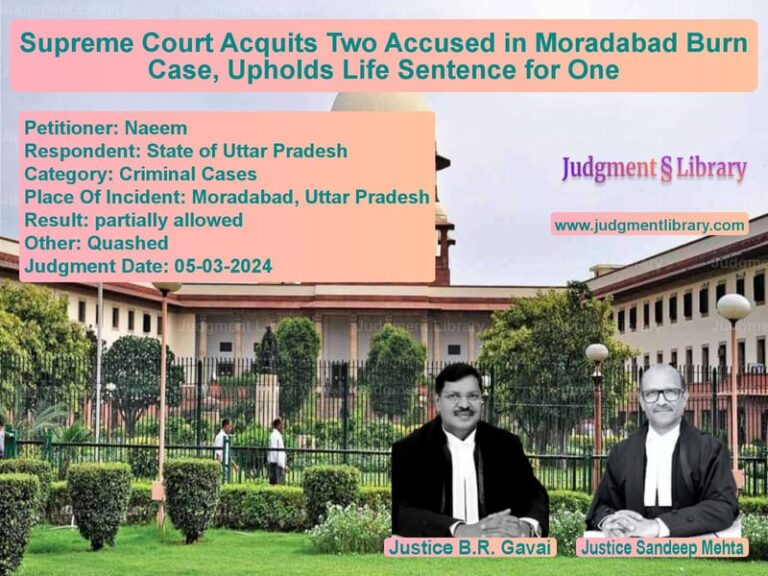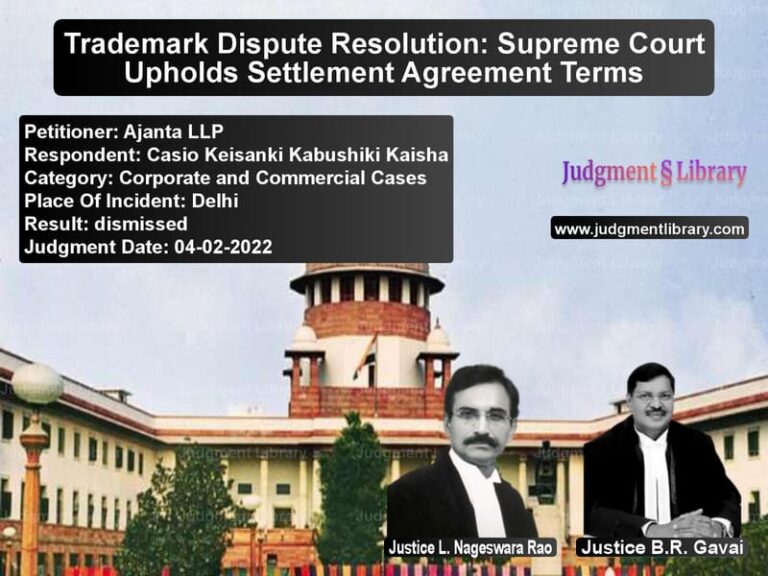Supreme Court Allows Relief in E-Auction Error: Bidder’s Human Mistake Considered
The Supreme Court of India has ruled in favor of M/s OMSAIRAM Steels & Alloys Pvt. Ltd. in a significant case regarding an inadvertent mistake in an e-auction for a mining lease. The case, M/s OMSAIRAM Steels & Alloys Pvt. Ltd. v. Director of Mines and Geology, Bhubaneswar & Ors., involved a typographical error during the bidding process, which led to an exaggerated bid being recorded as the final offer. The judgment provides crucial insights into the application of equity in commercial transactions and the doctrine of proportionality in contractual matters.
Background of the Case
The dispute arose from an e-auction for a mining lease of the Orahuri manganese and iron ore block conducted by MSTC Ltd. under the supervision of the Director of Mines and Geology, Bhubaneswar. The bidding process, which started with a floor price of 84%, saw multiple incremental bids. At 6:09 PM, the leading bid stood at 104.05%. However, when the appellant, M/s OMSAIRAM Steels & Alloys Pvt. Ltd., attempted to increase the bid by the minimum increment of 0.05%, a typographical error resulted in a bid of 140.10% instead of the intended 104.10%.
Realizing the mistake, the appellant immediately contacted the auction authorities but was unable to rectify the error. The next day, the Director of Mines and Geology informed the appellant that the highest bid was final and could not be altered. The appellant was declared the preferred bidder and was asked to submit the first installment of the upfront payment.
Key Legal Issues Before the Supreme Court
- Whether a bona fide mistake in an e-auction bid can be corrected post-auction.
- Whether the forfeiture of the appellant’s security deposit due to an inadvertent error was a disproportionate penalty.
- Whether the auction rules provided a mechanism for error rectification.
Petitioner’s Arguments
The counsel for M/s OMSAIRAM Steels & Alloys Pvt. Ltd. made the following key submissions:
- The appellant’s bid was a human error, as evidenced by the gradual bid increments leading up to the final round.
- The e-auction system did not provide an option to rectify mistakes once a bid was submitted.
- The penalty of forfeiting Rs. 9,12,21,315 in security deposit for an unintended error was excessively harsh and disproportionate.
- The auction authorities should have provided an avenue for bid correction to prevent such situations.
Respondent’s Arguments
The Director of Mines and Geology, Bhubaneswar, defended the auction process with the following arguments:
- The auction was conducted fairly, and all bidders had an equal opportunity to participate.
- The appellant had confirmed the bid by digitally signing it, which indicated full awareness of the bid amount.
- Allowing bid rectification after auction completion would compromise the integrity of the bidding process.
- The forfeiture of security deposit was a contractual obligation as per the auction rules.
Supreme Court’s Observations
The Supreme Court examined the legality and fairness of the auction process and made the following observations:
1. The Nature of the Error
The Court acknowledged that the appellant’s mistake was inadvertent and not an attempt to manipulate the auction process. It noted that the bid increments throughout the auction were gradual, and the sudden jump to 140.10% was clearly unintentional.
2. Lack of an Error-Rectification Mechanism
The Court highlighted the absence of a mechanism within the auction system to correct typographical errors. It noted that fairness in commercial transactions requires safeguards against human mistakes, especially in high-stakes financial decisions.
3. Doctrine of Proportionality
Referring to Coimbatore District Central Coop. Bank v. Employees Assn., the Court reiterated that penalties must be proportionate to the offense. It held that forfeiting a security deposit of Rs. 9.12 crore for a mistaken bid was excessive and unjust.
4. Equitable Relief
The Court cited West Bengal State Electricity Board v. Patel Engg. Co. Ltd., which allows for rectification of clerical mistakes in contractual matters when the mistake is bona fide and promptly reported.
Final Judgment
The Supreme Court ruled in favor of the appellant, stating:
- The bid of 140.10% was entered in error and should not be enforced.
- The e-auction should be restarted to allow fair competition.
- The appellant was required to pay Rs. 3 crore as a penalty to prevent similar mistakes in the future.
- If the penalty was paid within a month, the security deposit would be refunded.
Implications of the Judgment
This ruling sets a precedent for handling inadvertent mistakes in commercial contracts. It highlights the need for digital bidding platforms to incorporate safeguards against human errors. By balancing fairness with accountability, the judgment ensures that businesses are not unfairly penalized while maintaining the integrity of auction processes.
Petitioner Name: M/s OMSAIRAM Steels & Alloys Pvt. Ltd..Respondent Name: Director of Mines and Geology, Bhubaneswar & Ors..Judgment By: Justice Sanjiv Khanna, Justice Dipankar Datta.Place Of Incident: Odisha.Judgment Date: 15-07-2024.
Don’t miss out on the full details! Download the complete judgment in PDF format below and gain valuable insights instantly!
Download Judgment: ms-omsairam-steels-vs-director-of-mines-an-supreme-court-of-india-judgment-dated-15-07-2024.pdf
Directly Download Judgment: Directly download this Judgment
See all petitions in unfair trade practices
See all petitions in Corporate Compliance
See all petitions in Bankruptcy and Insolvency
See all petitions in Company Law
See all petitions in Mergers and Acquisitions
See all petitions in Judgment by Sanjiv Khanna
See all petitions in Judgment by Dipankar Datta
See all petitions in allowed
See all petitions in Modified
See all petitions in supreme court of India judgments July 2024
See all petitions in 2024 judgments
See all posts in Corporate and Commercial Cases Category
See all allowed petitions in Corporate and Commercial Cases Category
See all Dismissed petitions in Corporate and Commercial Cases Category
See all partially allowed petitions in Corporate and Commercial Cases Category







